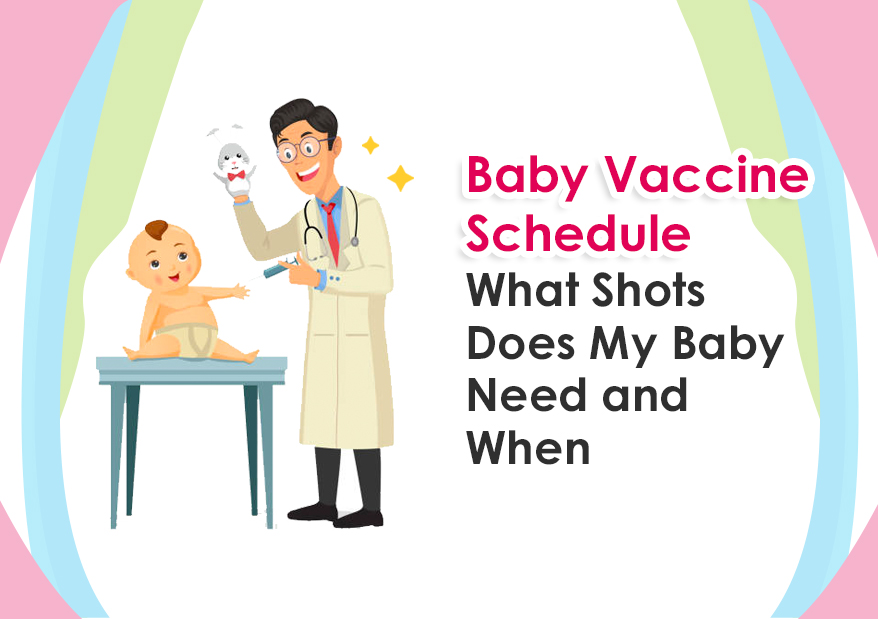When children are young, they are more vulnerable to illnesses and infections. This is primarily due to the fact that their immune systems are still developing. The body’s defense mechanism against infection-causing bacteria has yet to be created. Our immune system is designed to defend us from diseases, yet some pathogens are capable of overpowering our immune systems. When this happens, your kid may become ill. Problems arise when your child’s body is unable to identify the pathogens involved. Completing the entire baby vaccine schedule series is critical because it improves the ability of a child’s body to fight diseases and lowers the risk of disease transmission.
It is important to follow the vaccine dose series suggested by your child’s Pediatrician in order to provide the best possible protection for your child while also promoting their health and well-being. Keeping a newborn baby vaccination chart handy is a great idea!
Baby vaccine schedule is different across countries, therefore, speak to your Pediatrician or visit your nearest newborn care in Dubai.
Vaccines Recommended for a Baby
BCG Vaccine
The Bacillus Calmette–Guérin (BCG) vaccine is used to prevent tuberculosis (TB). TB is a bacterial infection that affects the lungs and, in some cases, other regions of the body. Since newborns and young children are more vulnerable to severe tuberculosis, the BCG vaccine is predominantly administered to them.
The BCG vaccine does not prevent infection with the bacteria that causes tuberculosis, but it does prevent the illness from developing. It is especially effective in preventing severe tuberculosis in newborns.
Vaccination age: It is administered shortly after your baby is born. The vaccine is usually given as an injection, usually into your baby’s upper left arm.
Before receiving the BCG vaccine, a test may be required. If your baby has already been infected with tuberculosis, the doctor will make a TB skin test (Mantoux test). If the skin test is positive (indicating that your child has previously been infected with tuberculosis), the BCG vaccine will not be administered. If the skin test comes back negative, your baby can receive the BCG vaccine.
Diphtheria, tetanus, pertussis (DTaP)
Diphtheria, tetanus, and pertussis (DTaP) vaccine is a combination vaccine that protects against three bacterial infections: diphtheria, tetanus (lockjaw), and whooping cough. It is given to newborns and young children to protect them from these dangerous infections.
Diphtheria is a bacterial infection that causes a thick coating in the back of the throat, making it difficult to breathe. Tetanus is caused by a bacterium that enters the body through cuts or wounds and produces a toxin that affects the nervous system. Pertussis, also known as whooping cough, is a contagious respiratory infection that makes breathing difficult for kids.
The DTaP vaccine is important for your baby because their immune system is still developing, making them more vulnerable to infections. Your baby will develop immunity against these diseases after getting the vaccine, providing protection throughout infancy and beyond.
Vaccination age: The DTaP vaccination is typically administered in five doses beginning at the age of 2 months, 4 months, 6 months, 15-18 months, and 4-6 years.
Hib vaccine
The Hib vaccine, also known as the Haemophilus influenzae type b vaccine, protects children against the bacteria Haemophilus influenzae type b (Hib). Haemophilus influenzae type b (Hib) bacteria cause an infection in the brain and spinal cord that can damage a baby’s brain and hearing. Many infants who receive the Hib vaccine are also protected from Hib-related infections such as meningitis, pneumonia, and blood, bone, and joint infections.
Vaccination age: Your infant should receive this vaccination at 2 months, 4 months, 6 months, and 12 to 15 months of age.
Hepatitis B vaccine
The Hepatitis B vaccine protects against the Hepatitis B virus (HBV), which causes liver damage and can progress to chronic infection or liver cancer. The vaccine stimulates your baby’s immune system into producing antibodies capable of recognising and combating the virus.
The Hepatitis B vaccine also protects others against the disease since it can spread to others without symptoms.
Vaccination age: The initial dose will be given to your baby at birth or shortly after, within the first 12 to 24 hours of life. Subsequent doses are normally given at 1 to 2 months of age, and then again at 6 to 18 months of age.
Polio Vaccine
Polio vaccine is used to protect against poliomyelitis, also known as polio. Polio can cause paralysis for life.
Administering the polio vaccine during infancy will protect your child from polio early on and provide long-lasting immunity. The Centre for Disease Control and Prevention suggests that children receive four doses of polio vaccine.
Vaccination age: Your child should receive one dose at each of the following ages: 2 months, 4 months, 6 to 18 months, and 4 to 6 years. If your child has not had all of their polio immunisations, visit your Pediatrician to finish the series.
Pneumococcal vaccine
Pneumococcal vaccine is a type of immunisation that protects against diseases caused by the bacteria Streptococcus pneumoniae, often known as pneumococcus. There are different pneumococcal vaccines available, including the pneumococcal conjugate vaccine (PCV13) and the pneumococcal polysaccharide vaccine (PPSV23), which protect against pneumococcal infections that cause pneumonia, blood infections, and bacterial meningitis.
PCV13 protects against 13 different varieties of pneumococcal bacteria, which are the most prevalent cause of pneumococcal infections in children. PPSV23 protects against 23 different kinds. These immunisations protect children from diseases and help prevent infections from spreading to others.
Vaccination age: Your baby should get PCV13 immunizations as a series of four injections: at 2 months of age, 4 months, 6 months, and 12–15 months.
PPSV23 depends on your child’s medical condition. Talk to the best Pediatrician in Dubai about it.
MMR Vaccine
The MMR vaccine protects against three extremely infectious viral diseases: measles, mumps, and rubella. Measles can cause pneumonia as well as brain inflammation. Mumps causes swollen, painful salivary glands. Rubella, also known as German measles, can cause birth defects if a pregnant woman becomes infected.
Vaccination age: The MMR vaccine is given in two doses. The first dose is usually administered around 12 to 15 months of age, and the second dose is given between 4 to 6 years of age.
Varicella vaccine
The varicella vaccine, often known as the chickenpox vaccine, protects against the varicella-zoster virus, which causes chickenpox. Sometimes the varicella vaccine is given in combination with the MMR vaccine.
Vaccination age: The varicella vaccine is given in two doses. The first dose is administered between 12 and 15 months of age, and the second dose is given between the ages of 4 and 6 years.
Things you must do during your baby vaccine schedule
- Follow your healthcare provider’s or national immunisation guidelines’ suggested baby vaccine schedule. Vaccines are timed to provide the best protection, thus it is critical not to miss or delay doses.
- In some cases, you could have skipped one or two vaccinations. When this happens, you must contact your Pediatrician to determine whether the shot can be given at a later time.
- If your child has a fever before receiving their vaccination, you must notify their Pediatrician. The immunisation will most likely be rescheduled by your Pediatrician.
- Fever is extremely normal after your child receives vaccine doses. In such cases, a sponge bath can be used to reduce body temperature. If the fever persists, visit your Pediatrician immediately.
- It is always preferable to have someone accompany you to the doctor’s clinic during child vaccines. This will help you keep your child calm and diverts their attention from the shots. It’s also a good idea to bring your child’s favourite toys or blanket with you.
- If you have any questions or need clarification, don’t hesitate to ask your best Pediatric doctor in Dubai or the healthcare provider administering the vaccines.
- Keep track of your child’s vaccines for future reference. This can help with school registration, travel, and ensuring your kid gets the right booster doses as they grow.
- It’s important to have a clear understanding of the vaccines being administered and any potential side effects.
- Stay informed on any modifications or changes to immunisation guidelines.
Visit myPediaclinic, the best Pediatric clinic in Dubai to ensure that your child receives all of the vaccinations required for the best health and protection. Our best Pediatric doctors in Dubai will walk you through the vaccination procedure, offering expert advice and giving vaccines on the recommended baby vaccine schedule.
Read here: Tips To Improve Your Child’s Immunity While Traveling
myPediaclinic – the best Pediatric clinic for kids ear piercing in Dubai
Our experienced award-winning Pediatricians at myPediaclinic in Dubai Healthcare City help young children have a stress-free and relaxing visit. As one of the most trusted and kid-friendly clinics in the country, the doctors and staff at myPediaclinic are focused on delivering quality treatment and consultation for the long-term health and well-being of their patients.





